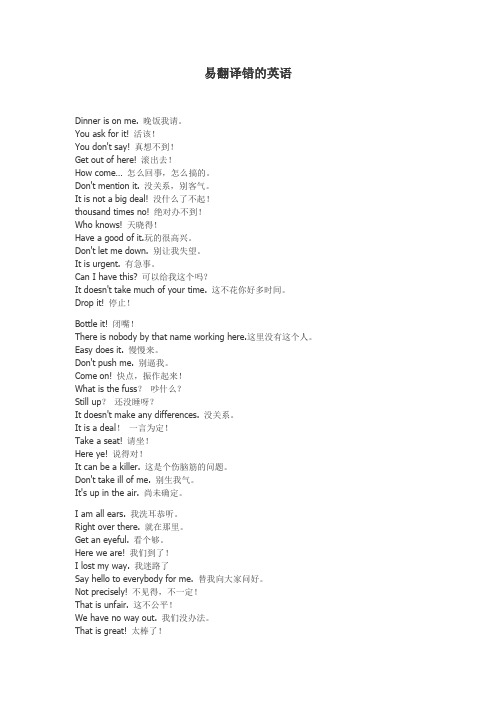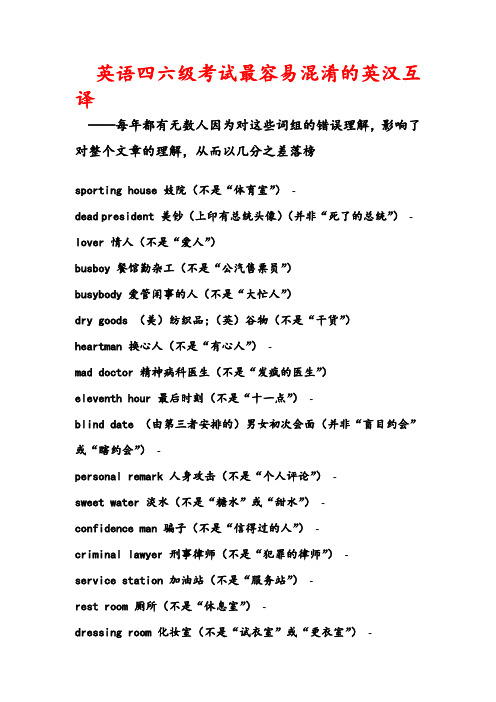汉译英最易翻错的100句
- 格式:doc
- 大小:34.50 KB
- 文档页数:3


汉译英最易翻错的100句(2)11.这家商店开辟了休息处,受到顾客的称赞。
[误] This department store has set up a resting-place, much to the customers' appreciation.[正] This department store has set up a lounge, much to the customers' appreciation. 注:英语的resting-place 虽然有“休息处”的意思,但更经常的是用来指“坟墓”,即“最后安息之处”。
因此,把公共场所的“休息处”译为resting-place 不很合适。
也有人将它译为rest-room,但那更不妥当,因为英语中的rest-room 是“厕所”的委婉说法,而“休息处”不是这个意思。
12.嘿,小伙子,千万别灰心。
[误] Hey, lad, don't lose your heart.[正] Hey, lad, don't lose heart.注:lose one's heart (to sb.) 是“心被...俘虏去,爱上...”的意思,而lose heart 才表示“灰心丧气,丧失勇气或信心”。
13.周末许多人睡得很晚。
[误] Many people sleep late at weekends.[正] Many people go to bed very late at weekends.注:第一句译文错在没弄懂sleep 的真正含义。
英语动词有短暂动词和持续动词之分,它们分别表示短暂动作和持续的动作或状态。
sleep 是典型的持续动词,表示“在睡觉”。
而汉语的“睡”既可表示“上床睡觉”的短暂动作,如:我昨天11点才睡;也可以表示“在睡觉”的持续动作和状态,如:他睡了整整10个小时。
原文属于前一种情况,即表示“上床睡觉”的短暂动作,故应该使用go to bed。

易翻译错的英语Dinner is on me. 晚饭我请。
You ask for it! 活该!You don't say! 真想不到!Get out of here! 滚出去!How come… 怎么回事,怎么搞的。
Don't mention it. 没关系,别客气。
It is not a big deal! 没什么了不起!thousand times no! 绝对办不到!Who knows! 天晓得!Have a good of it.玩的很高兴。
Don't let me down. 别让我失望。
It is urgent. 有急事。
Can I have this? 可以给我这个吗?It doesn't take much of your time. 这不花你好多时间。
Drop it! 停止!Bottle it! 闭嘴!There is nobody by that name working here.这里没有这个人。
Easy does it. 慢慢来。
Don't push me. 别逼我。
Come on! 快点,振作起来!What is the fuss?吵什么?Still up?还没睡呀?It doesn't make any differences. 没关系。
It is a deal!一言为定!Take a seat! 请坐!Here ye! 说得对!It can be a killer. 这是个伤脑筋的问题。
Don't take ill of me. 别生我气。
It's up in the air. 尚未确定。
I am all ears. 我洗耳恭听。
Right over there. 就在那里。
Get an eyeful. 看个够。
Here we are! 我们到了!I lost my way. 我迷路了Say hello to everybody for me. 替我向大家问好。

英语四六级考试最容易混淆的英汉互译——每年都有无数人因为对这些词组的错误理解,影响了对整个文章的理解,从而以几分之差落榜sporting house 妓院(不是“体育室”)dead president 美钞(上印有总统头像)(并非“死了的总统”)lover 情人(不是“爱人”)busboy 餐馆勤杂工(不是“公汽售票员”)busybody 爱管闲事的人(不是“大忙人”)dry goods (美)纺织品;(英)谷物(不是“干货”)heartman 换心人(不是“有心人”)mad doctor 精神病科医生(不是“发疯的医生”)eleventh hour 最后时刻(不是“十一点”)blind date (由第三者安排的)男女初次会面(并非“盲目约会”或“瞎约会”)personal remark 人身攻击(不是“个人评论”)sweet water 淡水(不是“糖水”或“甜水”)confidence man 骗子(不是“信得过的人”)criminal lawyer 刑事律师(不是“犯罪的律师”)service station 加油站(不是“服务站”)rest room 厕所(不是“休息室”)dressing room 化妆室(不是“试衣室”或“更衣室”)horse sense 常识(不是“马的感觉”)capital idea 好主意(不是“资本主义思想”)familiar talk 庸俗的交谈(不是“熟悉的谈话”)black tea 红茶(不是“黑茶”)black art 妖术(不是“黑色艺术”)black stranger 完全陌生的人(不是“陌生的黑人”)white coal (作动力来源用的)水(不是“白煤”)white man 忠实可靠的人(不是“皮肤白的人”)yellow book 黄皮书(法国政府报告书,以黄纸为封)(不是“黄色书籍”)red tape 官僚习气(不是“红色带子”)green hand 新手(不是“绿手”)blue stocking 女学者、女才子(不是“蓝色长统袜”)China policy 对华政策(不是“中国政策”)Chinese dragon 麒麟(不是“中国龙”)American beauty 一种玫瑰,名为“美国丽人”(不是“美国美女”)English disease 软骨病(不是“英国病”)Indian summer 愉快宁静的晚年(不是“印度的夏日”)Greek gift 害人的礼品(不是“希腊礼物”)Spanish athlete 吹牛的人(不是“西班牙运动员”)French chalk 滑石粉(不是“法国粉笔”)pull one's leg 开玩笑(不是“拉后腿”)in one's birthday suit 赤身裸体(不是“穿着生日礼服”)eat one's words 收回前言(不是“食言”)an apple of love 西红柿(不是“爱情之果”)handwriting on the wall 不祥之兆(不是“大字报”)bring down the house 博得全场喝彩(不是“推倒房子”)have a fit 勃然大怒(不是“试穿”)make one's hair stand on end 令人毛骨悚然—恐惧(不是“令人发指——气愤”)be taken in 受骗,上当(不是“被接纳”)think a great deal of oneself 高看或看重自己(不是“为自己想得很多”)pull up one's socks 鼓起勇气(不是“提上袜子”)have the heart to do (用于否定句)忍心做……不是“有心做”或“有意做”)What a shame! 多可惜!真遗憾!(不是“多可耻”)You don't say! 是吗!(不是“你别说”)You can say that again! 说得好!(不是“你可以再说一遍”)I haven't slept better. 我睡得好极了。

翻译技巧:汉译英最易翻错的100句01. 有他这颗扫帚星,什么事情都办不成。
[误] With a comet like him, nothing can be accomplished.[正] With a jinx like him, nothing can be accomplished.注:“扫帚星”是中国人对“慧星”(comet)的俗称,因其后面象拖着的一条像扫帚一样的长尾巴而得名。
在中国古代,“扫帚星”被认为是灾难的预兆,并被用来比喻不吉利的人或事;祸根:(person or thing that is thought to bring)bad luck(to sb/sth);curse。
英语的comet 虽然没有这层含义,但却有一个对应的说法,即jinx。
例:There's a jinx on/Someone's put a jinx on this car: it's always giving me trouble. “这辆汽车上有什么妨人的东西,总给我找麻烦”。
02.萝卜青菜,各有所爱。
[误] Some prefer radish but others prefer cabbage.[正] Tastes differ.注:Tastes differ/vary 是句英语谚语,除此以外,原句还可翻译成No dish suits all tastes 或You can never make everyone happy 等。
《新概念英语》第三册第23课的标题是:One man's meat is another man's poison,表达的很生动。
总之,应采取意译。
03.他一向嘴硬,从不认错。
[误] He has always got a hard mouth and never admit a fault.[正] He never says uncle.注:say (cry) uncle: to give up or in; to surrender; to admit defeat. Mainly used by boys, as when fighting。

翻译技巧:汉译英最易翻错的100句(13)[误] Here comes the car. You go first, please.[正] Here comes the car. After you.注:第一句译文虽然把“请”翻译出来了,但还是带有命令的口吻。
地道的说法应当是 After you。
另外,不少人以为汉语的“请”等同于英语的 please,其实并非如此。
例如,在餐桌上请人吃菜或喝酒就不用please,地道的说法是 Help yourself。
62. 房间里有一张床、两张桌子和五把椅子。
[误] There are one bed, two desks and five chairs in the room.[正] There is one bed, two desks and five chairs in the room.注:there be 句型中,be 动词的单复数取决于离它最近的那个词。
原文虽然一共列举了八件家具,但是依据英语的谓语就近原则,one bed 打算了应当使用 is。
63. 我不想听他那些空话。
[误] I don’t want to hear his empty words.[正] I don’t want to hear his hollow words.注:虽然 empty 和 hollow 都有“空洞的”之意,但表达“空话”时,英语习惯用 hollow words 或 empty talk。
64. 他是我们的死敌。
[误] He is our dead enemy.[正] He is our deadly enemy.注:dead 作形容词时表示“死的,无感觉的”,而 deadly 才表示“致命的,不共戴天的”。
65. 奥斯本名义上是个医生,但他成天都呆在股票交易所里。
[误] Osborne is a doctor by name only, but he stays in the stock exchange all day long.[正] Osborne is a doctor in name only, but he stays in the stock exchange all day long.注:by name 和 in name 虽然形似,但涵义却有区分。
56. 我的学习很忙。
[误] My study is very busy. [正] I am very busy with my study. 注:第⼀句译⽂完全套⽤汉语的结构和语序,却犯了英⽂的句法错误。
因为在英语中,study(学习)是⼀个⾏为,并不懂得忙不忙,感到忙的应是进⾏这⼀⾏为的⼈。
所以,be busy with sth. 或 be busy (in) doing sth. 才是地道的英语表达。
57. 给他当⼆把⼿我看也值得。
他太能⼲了。
[误] I feel it worth being a second hand to him. He is so capable. [正] I feel it worth playing second fiddle to him. He is so capable. 注:英语的 second hand 作名词指“中间⼈”、“旧货”或“助⼿⼯⼈”,⽽汉语的“⼆把⼿”是“副⼿”,即“第⼆负责⼈”的意思,所以⼆者不是⼀回事。
play second fiddle 则源于管弦乐队中第⼀提琴⼿(first violin)不在的时候由第⼆提琴⼿负责,并被⼈们引申为“当主要领导⼈的副⼿”,也就是我们所说的“当第⼆把⼿”。
由此,不难猜出“当⼀把⼿”译成英语应该是 paly first fiddle 了。
58. 电车上⼗分拥挤,⼏乎没有⽴⾜之地。
[误] The tram was so crowded that there was hardly sufficient room for you. [正] The tram was so crowded that there was scarcely sufficient room for you. 注:副词 hardly 和 scarcely 虽然都含有“⼏乎不”等否定含义,有些时候也可以互换,如:I could hardly/scarcely recognize her(我⼏乎认不出她来了),但仍有细微的差异。
英语翻译翻译技巧:口译最容易出错的经典句子在汉译英考试的中,常常会出现“中式英语”翻译,这是我们常常会犯的错,但是当不清楚怎么翻译的时候,我们又只能用这种方法。
下面就和大家分享翻译技巧:口译最容易出错的经典句子,希望能够帮助到大家,来欣赏一下吧。
翻译技巧:口译最容易出错的经典句子1 永远记住你remember you forever 不对,因为没有人能活到forever ,而应该是always rememberyou。
2 黄头发不是yellow hair,而应该是blond/blonde,西方人没有yellow hair的说法。
3 厕所绝对不是WC 或者toilet,这些是马桶和茅坑的说法,假想一下,你对老外说,不好意思,请问茅坑在哪里?你说话是不是过于洒脱,尺度太大了?正解应该是mensroom/womensroom/restroom/powder room等。
4 还有些很过时的已经可以入土的说法,比如真遗憾不要再用its a pity ,用thats too bad/its a shame更流行些,还有裤子不要用trousers了,而是pants/slacks/jeans。
马马虎虎最好用average/fair/allright/not too bad/OK(西方人很少使用so-so),提到好吃不要只能反应出一个单词,就是delicious,可以多用用yummy/nice/tasty/appetizing等。
5 还有些在国外只有小孩子才用的过于孩子气的说法也应该避免使用,比如再见用bye-bye 不好,直接用bye/see you/see you later/later比较合适。
再比如面条,少用孩子气的noodles,而最好用pasta。
6 一些公共场合的用语也是同学最不会翻译的,比如“小心台阶”被翻成“pay attention to the steps”而非正确的“mind the steps”。
汉译英最易翻错的100句
1.我们要把祖国建设成为社会主义的现代化强国。
[误] We will build our motherland into a socialist modern powerful country.
[正] We will build our motherland into a modern powerful socialist country.
注:形容词作为修饰语在汉语和英语中都很常用,但使用的先后次序却有所不同。
在英语中我们一般遵循“靠近原则”,即越能说明本质属性的修饰词越靠近它所修饰的名词,当从这一点看不出区别时,就靠词的长短来决定,短的在前,长的在后。
原文中最能说明“国家”本质的定语是“社会主义的”,所以socialist 要最靠近它所修饰的中心词。
2.中华人民共和国主席
[误] Chairman of the People's Republic of China
[正] President of the People's Republic of China
注:以前,我们一直将“主席”翻译为chairman,例如:great leader Chairman Mao(伟大领袖毛主席)。
其实“主席”与chairman 并不等义,chairman 在英语中通常指会议或某一具体组织的负责人,它的权力和重要性不及中文的“主席”。
这就是为什么1983年,在我国《宪法》的英译单行本中开始使用President一词,并沿用至今。
另外,国内仍有不少词典把“班/级长(学校的)”译为“class monitor”,这是“四人帮”时代的产物,那时的“班长”是专司监管学生的,所以译作“monitor”。
而“班长”的正确译文应该是“class president”。
21.最近的人口统计显示中国人口已超过12亿。
3.最近的人口统计显示中国人口已超过12亿。
[误] The latest census shows that China's population has surpassed 1.2 billion.
[正] The latest census shows that China's population exceeds 1.2 billion.
注:surpass 和exceed 译成中文虽然都是“超过,胜过”的意思,但出现具体数字时要用后者。
4.原来如此。
一经你解释我就明白了。
[误] So it is. I understand soon after your explanation.
[正] So that's how it is. I understand soon after your explanation.
注:So it is 的意思是“的确如此”,它是用来表示对对方观点的赞同的。
例如:
A: It is a fine day today!
B: So it is.
而在表达恍然大悟时,英文要用So that's how it is 或So that explains it, 或更简单地道的说法Oh, I see.
5.你不好好学习,还想去牛津上大学。
这可真是个不切实际的幻想哟!
[误] You don't study hard, yet you want to go to Oxford. What an impractical illusion!
[正] You don't study hard, yet you want to go to Oxford. What an illusion!
注:汉语中的修饰语往往用的很多,目的在于加强语气,但这种表达习惯在翻译时必须进行处理。
illusion 本身就有impractical 的含义,而英语中在表意已经很明确的情况下是无需重复的。
6.想让他答应这样的要求恐怕不大可能。
[误] I'm afraid it is impossible for him to agree to such a request.
[正] I'm afreaid it is unlikely for him to agree to such a request.
注:impossible 表示“完全不可能”,所以与原文有出入。
在英语中,probable 表示的可能性最大,其次是possible,再次是likely。
而常用的句式为it is probable/possible/likely for sb. to do sth.,或sb. be likely to do sth.。
7.一群蚂蚁
[误] a group of ants
[正] a colony of ants
注:表示群体时,group 通常指人或物,而colony 才指生物群体。
8.哈罗得挥金如土,没有一点积蓄。
[误] Harold spends money like dirt, and has no savings.
[正] Harold spends money like water, and has no savings.
注:英国是一个岛国,离不开水;而我们中国的许多地区深处内陆,人们的生活离不开土地。
所以,英语中有许多习语与“水”有关,而汉语却常常拿“土”作比。
这就是为什么同样是
比喻花钱浪费,大手大脚,英语是spend money like water,而汉语却是“挥金如土”。
此外,英语中还有很多有关船和水的习语,例如:rest on one's oars(暂时歇一歇),keep one's head above water(奋力图存),be all at sea(不知所措)等等。
9.这只表的价钱很贵。
[误] The price of the watch is dear.
[正] The watch is dear. /The price of the watch is high.
注:以物品为主语时用dear 或cheap,以定价为主语时就说high 或low.
10.昨天晚上我们玩得很愉快。
[误] We played very pleasantly last night.
[正] We enjoyed ourselves very much last night./ We had a good time last night.
注:玩牌,打球,演戏之类就用play,汉语这儿说的玩是指度过一个愉快的时候,最好译成enjoy oneself 或have a good time.。